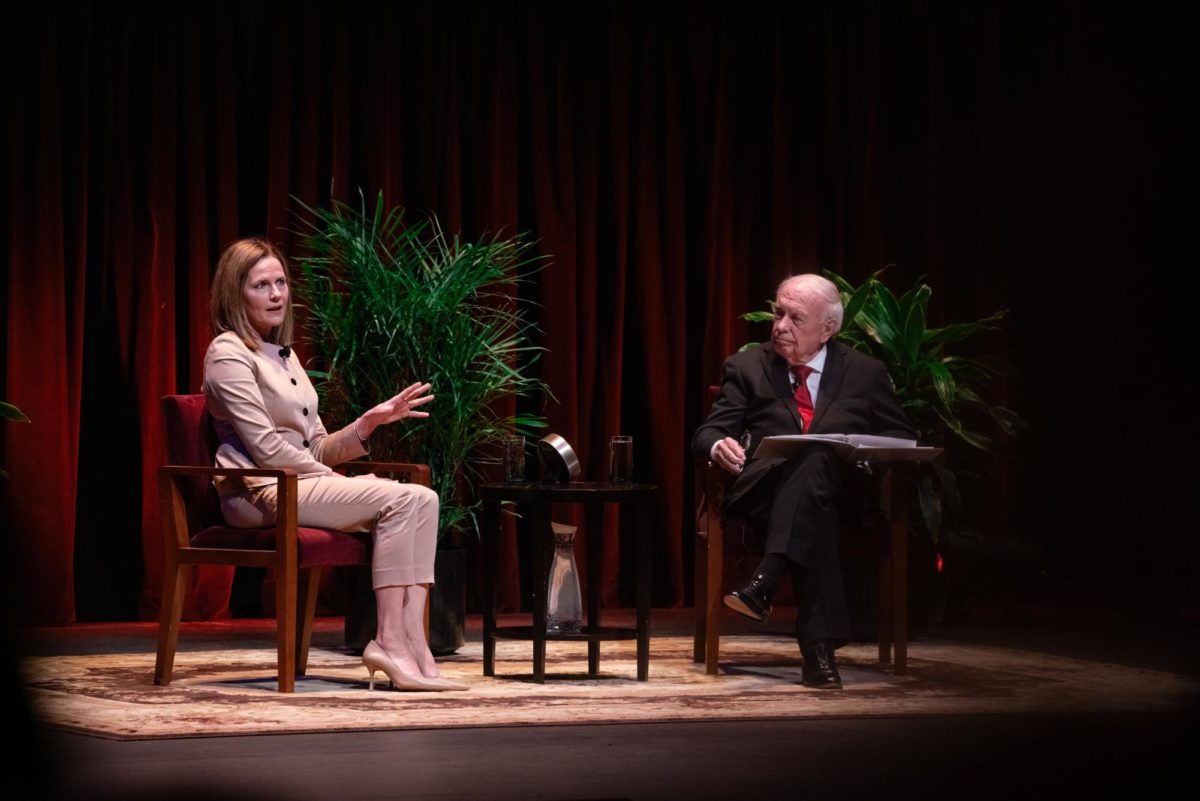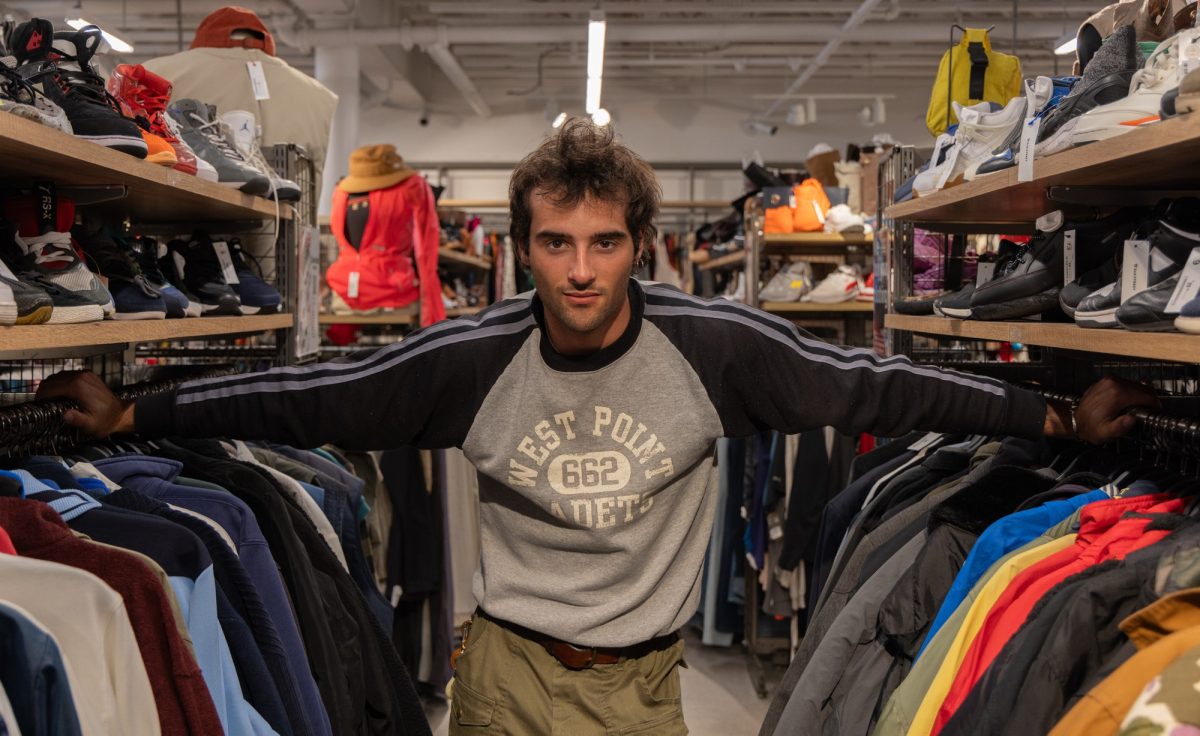The University of Minnesota Law School’s seventh annual Robert A. Stein Lecture took place at Northrop Auditorium on Monday featuring United States Supreme Court Justice Amy Coney Barrett.
Stein, former dean of the law school and professor, moderated the lecture as Barrett spoke about life as a current Supreme Court justice and the state of current law.
Amy Coney Barrett speaks at Northrop Auditorium
Barrett spoke about her relationships with other Supreme Court justices and said despite having a variety of opinions and ideas she spends a lot of time with other justices on the Court.
“The fire gets put on the page, but it is not expressed in the interpersonal relationships we have,” Barrett said. “We eat together and spend time with each other, and when you spend time with people, it’s easy to see them as people.”
She added Justice Antonin Scalia inspired her judicial and life philosophies, as Barrett has four children under the age of 18 and had to balance being a mother and a Supreme Court justice.
According to Barrett, Scalia taught her to stay committed to family no matter the circumstances.
“There would be very little difference between us if you asked about the central role of a judge – to adhere to the text when the text has a clear answer, and to not impose one’s own views on the law,” Barrett said.
Members of Students for a Democratic Society (SDS) interrupted the lecture, standing up from their seats in the balcony and shouting chants. Barrett sat emotionless, looking at SDS as they were chanting.
After being told by University officials to quiet down, they were escorted out of the auditorium by the University of Minnesota Police Department. There were no additional interruptions throughout the event.
“Not the court, not the state, the people must decide their fate,” SDS members chanted.
Barrett also discussed the importance of overturning Supreme Court precedent and mentioned notable Supreme Court cases, such as Brown v. Board of Education, which made the segregation of public schools unconstitutional, would not be possible without overturning precedent.
“There’s a cost to democratic choice because people are either hindered from doing things they might want to do, or the state is prohibited from doing things that they might want to [do],” Barrett said. “Sometimes it’s important to overrule precedent because they can be costly and it can be difficult to remedy errors because the court doesn’t fix it.”
Barrett answered questions asked by law school students as Stein read them off from a set of cards. Barrett talked about how Supreme Court justices do not allow their empathy and emotions to affect Supreme Court rulings and judges should think “with their heads, not their hearts.”
Students protest outside Northrop
Hundreds of people gathered outside Northrop Auditorium to protest Barrett’s presence and speech at the University.
Students for a Democratic Society (SDS) and the Minnesota Abortion Action Committee (MNAAC) organized the event. Teachers, alumni, students, workers and others came together to have their voices heard.
MNAAC and SDS distributed signs to protestors with statements like “abort the court,” “abortion is a human right” and “Amy Coney Barrett off our campus.”
Several speakers addressed abortion rights, the United Auto Workers strike, immigration rights, the Israel-Palestine conflict, climate justice and their general dissent of Barrett’s presence on campus.
Chants resounded, including “racist, sexist, anti-gay, ACB go away,” “what do we need, collective action,” and “not the church, not the state, the people must decide their fate.”
Gillian Rath, an SDS member and fourth-year student at the University, expressed satisfaction with the protest’s turnout.
“I was excited to see so many people bring their own signs and stay for a long time,” Rath said.
She added that she and eight other members of SDS disrupted Barrett’s speech and described it as scary but empowering, given the large captive audience.
“Standing up, chanting and seeing her listen was really rewarding,” Rath said.
Celia Nimz, a University alumna and SDS member, said SDS was told they would not be able to disrupt but did anyway.
“We aren’t going to sit back and take that. When they invite someone like ACB, we’re gonna stand up and disrupt, because that’s all they’ve given us,” Nimz said.
Mira Altobelle-Resendez, an SDS member and University alum, said they disagree with Barrett’s opinions and actions on the Supreme Court, and are offended by the University’s decision.
“The University likes to put out statements that it is for diversity, equity and inclusion; meanwhile, there have been great injustices done by Amy Coney Barrett,” Altobelle-Resendez said. “It shows they don’t support students that need abortion, their trans and queer students, and their undocumented students. It kind of reverses the sweet talk they put in their emails.”
Priya Kingsley, a first-year student at the University, said she came to the protest because she thinks Barrett is bigoted and has taken away the rights of many people.
“So many students have been directly affected and hurt by what ACB is doing, and the University should not support that,” Kingsley said.
Pamela Scott, a continuing-education student at the University who has been taking classes since turning 62 years old, said she came to the protest because she thinks Barrett is an illegitimate member of the Supreme Court and felt disappointed at the University for inviting her.
“I feel that she is a pretender and does not have the best interest of the United States at heart,” Scott said. “She is an incredibly divisive force in United States politics and has no business being on this campus.”
She added she wished the crowd of protestors was larger.
“I think that people in their twenties need to really be on top of this stuff,” Scott said. “I know it’s hard to stay on top of current affairs and hard to get away from your studies, it’s so important.”
She said she was struck by the image of police officers lined up on the stairs of Northrop during the protest.
“It’s very intimidating,” Scott said. “They are armed to the teeth and these are a bunch of young 20-year-olds faced with that and the University is sending the wrong message.”
Robyn Harbison, a member of the MNAAC and University of Minnesota alum, helped plan the event. As a transgender person, they said, they are demanding their basic human rights be met.
“Abortion is healthcare and it deserves to be accessible nationwide,” Harbison said. “We want people to know we are here for queer and trans rights and we always will be. We deserve better as a community.”
Harbison added the University inviting Barrett to speak showed they do not care about their students.
“It’s really a slap in the face to working-class, queer and trans students,” Harbison said.
Harbison was happy with the turnout and that people were willing to step away from work and school to protest.
“I feel really proud of everyone for turning out, especially on a Monday afternoon during the work week, and it’s really appreciated,” Harbison said. “It’s really hopeful and inspiring because together we can make a change.”
This story was originally published on Minnesota Daily on October 16, 2023.







































